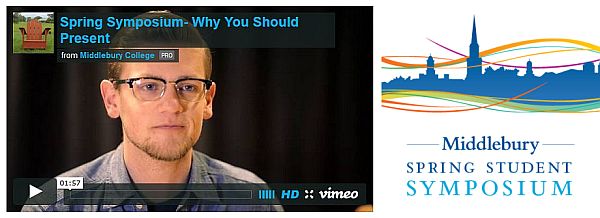Remember to submit your application by midnight on Friday, 2/27 to present in the Spring Student Symposium this April! Check out the video below to hear from fellow students who have presented why they would do it again.
____________________
Dear Students and Colleagues:
Join us in celebrating the diversity of a Middlebury education! The 2015 Spring Student Symposium will begin in the Mahaney Center for the Arts on Thursday night, April 9 with a keynote talk by Kevin Murungi ’01, the Director of Human Rights and Foreign Policy at Global Kids, followed by a reception and student presentations. The Symposium continues all day Friday, April 10 with presentations of student work in McCardell Bicentennial Hall.
We invite students from all four years and in all departments and programs to participate. If you have done research in a class, independently, or through an internship; if you would like to read, show, or perform a creative work; if you have a project to present in a poster or oral format, please apply to present your academic work! The application deadline is February 27, 2015.

More information and the application are available at the Undergraduate Research website at http://go.middlebury.edu/sym.
Students: Your application must include a project description (200 words) that has been approved by your faculty or staff sponsor.
Faculty and Staff: Please encourage students to apply.
We look forward to seeing you all at the Symposium!
Pat Manley, Professor of Geology
Lisa Gates, Associate Dean for Fellowships and Research
for the Spring Symposium Planning Committee
…the Symposium encapsulates Middlebury at its best. It was valuable for me to prepare and then present in a professional setting. An equally valuable component of the Symposium is how it celebrates students work. I am grateful that Middlebury has put time, energy and thought into a creating a day that celebrates all that goes on here– much of which could go unseen and unheard.
— 2014 Symposium Participant
